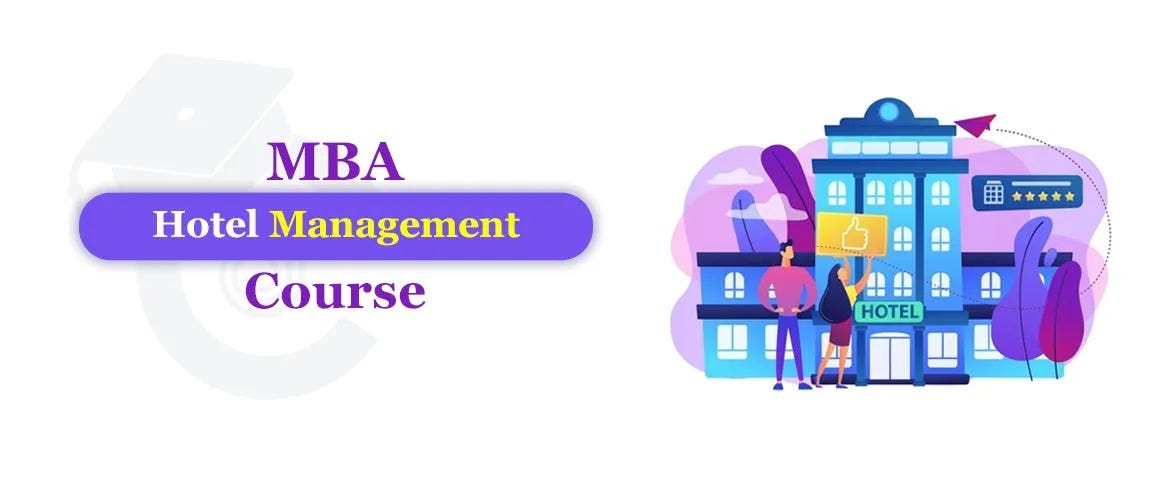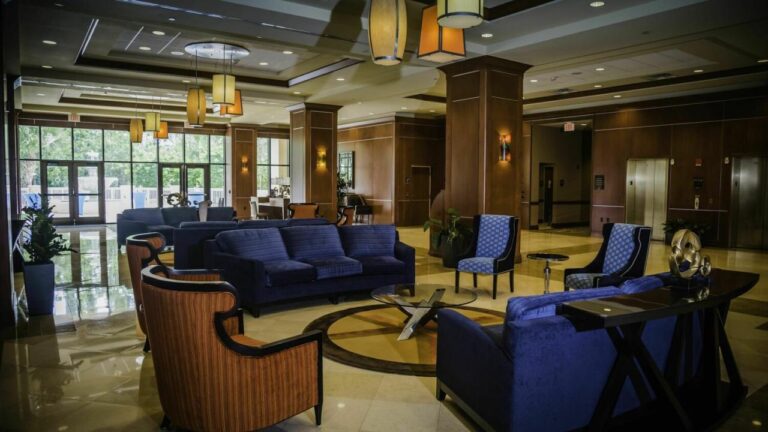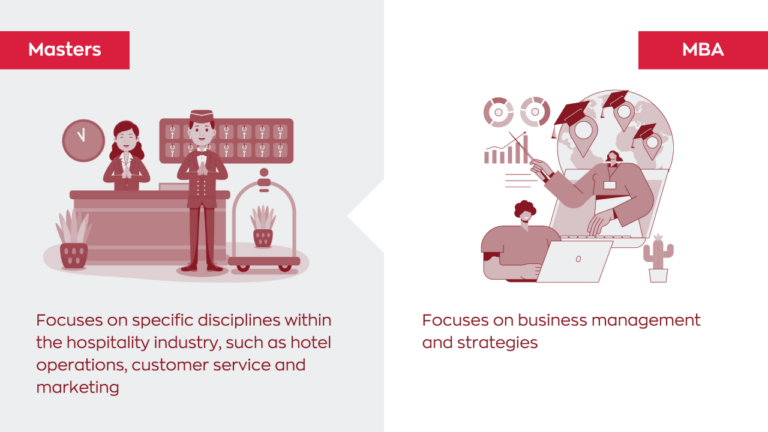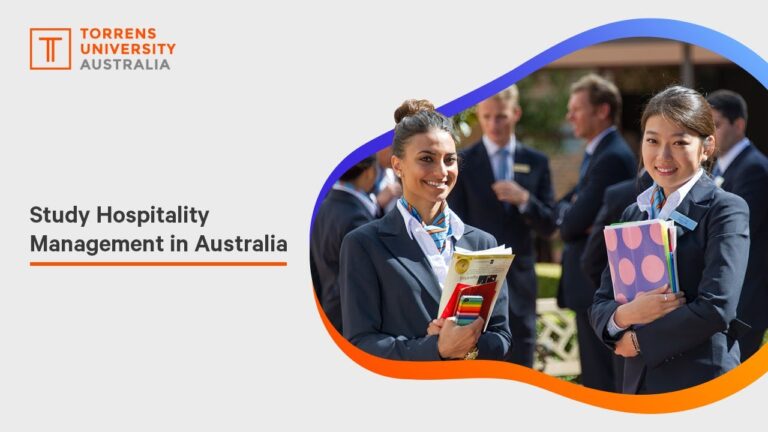Hotel and Tourism Management MBA Online A Comprehensive Guide
Hotel and tourism management MBA online programs offer a flexible and convenient pathway to a rewarding career in the hospitality industry. This dynamic field demands skilled professionals who can navigate the complexities of global markets, innovative technologies, and evolving customer expectations. An online MBA provides the strategic management skills and industry-specific knowledge necessary to excel in this competitive landscape, offering a blend of theoretical learning and practical application tailored to the demands of the modern hospitality sector.
This guide explores the various facets of pursuing an online Hotel and Tourism Management MBA, from curriculum details and career prospects to financial considerations and program selection.
We will delve into the specific curriculum components, admission prerequisites, and compare the online learning experience with traditional classroom settings. We’ll examine potential career paths, salary expectations, and the skills you’ll acquire. Furthermore, this guide will address the technological requirements, learning methodologies, and resources available to online students. We will also discuss program specializations, accreditation, and financial aid options to help you make an informed decision about your future.
Program Overview

An online MBA in Hotel and Tourism Management offers a flexible and convenient pathway to a rewarding career in the hospitality industry. This program provides students with a comprehensive understanding of business principles specifically applied to the dynamic world of hotels, resorts, and tourism. The curriculum blends theoretical knowledge with practical application, equipping graduates with the skills needed to excel in management roles.
Curriculum of an Online Hotel and Tourism Management MBA Program
A typical online Hotel and Tourism Management MBA curriculum covers a broad range of subjects, encompassing core business principles and specialized hospitality topics. Core courses might include accounting, finance, marketing, and strategic management. Specialized courses often focus on areas such as revenue management, hotel operations, tourism planning, event management, and sustainable tourism practices. Many programs also incorporate case studies, simulations, and projects that allow students to apply their learning to real-world scenarios.
Electives often allow for specialization in areas like luxury hotel management or ecotourism.
Admission Requirements for Online Hotel and Tourism Management MBA Programs
Admission requirements vary across institutions, but generally include a bachelor’s degree from an accredited university, a minimum GPA (often 3.0 or higher), and GMAT or GRE scores (though some programs may waive these requirements based on professional experience). Many programs also require letters of recommendation, a statement of purpose outlining career goals, and a resume demonstrating relevant experience in the hospitality industry or related fields.
International students typically need to provide proof of English language proficiency (TOEFL or IELTS scores).
Comparison of Online and On-Campus MBA Learning Experiences
Online MBA programs offer flexibility and convenience, allowing students to study at their own pace and from any location with an internet connection. This is particularly beneficial for working professionals who may not have the time or resources to attend traditional on-campus classes. However, the on-campus experience provides opportunities for direct interaction with professors and peers, fostering collaboration and networking.
Online programs often utilize technology such as video conferencing, online forums, and virtual simulations to replicate aspects of the on-campus learning experience, but the level of interaction may differ. The choice between online and on-campus learning depends on individual learning styles, career goals, and personal circumstances.
Sample Weekly Schedule for an Online Hotel and Tourism Management MBA Student
A typical weekly schedule might involve attending live online classes (synchronous learning) for a few hours, completing assigned readings and coursework (asynchronous learning) for several more hours, and participating in online discussions and group projects. This schedule will vary based on the intensity of the course load and individual student preferences. A sample schedule could look like this:Monday: Review assigned readings, participate in online discussion forum.Tuesday: Attend live online class (2 hours), complete assigned homework.Wednesday: Work on group project, review lecture notes.Thursday: Attend live online class (2 hours), prepare for upcoming quiz.Friday: Complete quiz, begin readings for next week.Weekend: Dedicate time to larger assignments, projects, or catch-up work.
Comparison of Three Online Hotel and Tourism Management MBA Programs
| Program | Tuition Fees (USD) | Program Length | Specializations |
|---|---|---|---|
| Example Program A | $50,000 – $60,000 | 24 months | Luxury Hotel Management, Sustainable Tourism |
| Example Program B | $40,000 – $50,000 | 18 months | Revenue Management, Event Management |
| Example Program C | $35,000 – $45,000 | 12 months (accelerated) | International Hotel Management, Ecotourism |
Program Structure and Learning Methods: Hotel And Tourism Management MBA Online
Our online Hotel and Tourism Management MBA program is designed to provide a flexible and engaging learning experience, leveraging a variety of methods to cater to diverse learning styles and schedules. The program blends asynchronous and synchronous learning components, incorporating interactive case studies and real-world applications to ensure a comprehensive understanding of the industry.This program utilizes a blended learning approach, combining the flexibility of online learning with the benefits of structured interaction.
This approach allows students to manage their studies around their existing commitments while maintaining a strong connection with faculty and peers.
Learning Methods Employed
The program utilizes a multifaceted approach to learning, combining asynchronous and synchronous methods. Asynchronous learning involves accessing course materials and completing assignments at your own pace, within designated deadlines. This flexibility allows students to balance their studies with other responsibilities. Synchronous learning, conversely, involves real-time interaction with instructors and peers through live online sessions, webinars, and virtual discussions. These sessions provide opportunities for immediate feedback, collaborative learning, and networking.
Case studies, based on real-world scenarios from the hospitality and tourism industries, are integrated throughout the curriculum, encouraging critical thinking and problem-solving skills. These cases provide practical applications of theoretical concepts learned in lectures and readings.
Technological Requirements
Successful participation in the online MBA program requires reliable access to a computer with a stable internet connection. Specific software requirements include a web browser (such as Chrome, Firefox, or Safari), a word processing program (such as Microsoft Word or Google Docs), and access to a video conferencing platform (such as Zoom or Microsoft Teams) for synchronous sessions. Students will also need reliable email access for communication with instructors and peers.
A headset with microphone is also recommended for optimal participation in online discussions and webinars.
Advantages and Disadvantages of Online Learning in Hotel and Tourism Management
Online learning offers significant advantages for aspiring hotel and tourism managers. The flexibility to study at your own pace and location is particularly beneficial for those balancing work and family commitments. Furthermore, the online environment often provides access to a wider range of resources and perspectives than a traditional classroom setting. However, the lack of face-to-face interaction can present challenges.
Building strong relationships with instructors and peers may require more proactive effort. Furthermore, the self-discipline required for successful online learning can be demanding for some students. The practical, hands-on aspects of the industry may require supplementary efforts to gain real-world experience alongside the online curriculum. For example, seeking internships or shadowing opportunities can complement the theoretical knowledge gained online.
Challenges Faced by Online MBA Students and Strategies to Overcome Them
Online learning presents unique challenges. Time management is crucial, requiring students to establish a consistent study schedule and prioritize tasks effectively. Maintaining motivation and engagement can be difficult without the structure of a traditional classroom. Procrastination can be a significant obstacle. Strategies to overcome these challenges include creating a dedicated study space, setting realistic goals, utilizing time management techniques (such as the Pomodoro Technique), actively participating in online discussions, and connecting with fellow students to build a supportive learning community.
Seeking support from academic advisors and utilizing available tutoring services are also recommended.
Resources Available to Students
The online MBA program provides a wealth of resources to support student success.
- Online Library: Access to a vast collection of e-books, journals, and other scholarly resources relevant to hotel and tourism management.
- Tutoring Services: Individualized support from subject matter experts to address specific learning needs.
- Online Discussion Forums: Platforms for interaction with instructors and peers, fostering collaboration and knowledge sharing.
- Career Services: Guidance and resources to assist students in their job search and career development.
- Technical Support: Assistance with any technological issues encountered during the program.
Specializations and Focus Areas

Our online MBA in Hotel and Tourism Management offers several specializations designed to cater to diverse career aspirations within the dynamic hospitality industry. These specializations provide focused learning experiences, equipping graduates with the specialized knowledge and skills necessary to excel in their chosen fields. This section will detail three common specializations, highlighting their unique features, career paths, and curriculum differences.
Hotel Management Specialization
This specialization provides a deep dive into the operational aspects of hotels, encompassing revenue management, front office operations, food and beverage management, and human resource management within the hotel context. Graduates develop expertise in optimizing hotel performance, enhancing guest experiences, and managing diverse teams. The curriculum emphasizes strategic decision-making, financial analysis specific to hotel operations, and the application of technology to improve efficiency and guest satisfaction.
Career opportunities include roles such as Hotel General Manager, Revenue Manager, Director of Food and Beverage, and Human Resources Manager within hotels of various sizes and brands. Required skills include strong leadership, financial acumen, problem-solving abilities, and excellent communication skills.
Tourism Management Specialization
This specialization focuses on the broader tourism industry, encompassing destination marketing, tourism planning, sustainable tourism practices, and event management. Students learn to analyze tourism trends, develop effective marketing strategies, and manage tourism-related projects. The curriculum includes modules on tourism economics, cultural tourism, and the impact of technology on the tourism sector. Career opportunities range from roles in tourism boards and destination marketing organizations to positions in travel agencies, tour operators, and event management companies.
Essential skills include strong marketing and communication skills, strategic planning abilities, an understanding of cultural sensitivities, and knowledge of sustainable tourism practices.
Hospitality Revenue Management Specialization
This specialization focuses on the strategic application of revenue management principles across the hospitality industry. Students learn advanced techniques for pricing, forecasting, and inventory control to maximize revenue and profitability. The curriculum covers topics such as yield management, pricing strategies, data analytics, and revenue management systems. Graduates are equipped to optimize revenue streams for hotels, resorts, restaurants, and other hospitality businesses.
Career opportunities include roles as Revenue Manager, Pricing Analyst, and Director of Revenue Management in various hospitality settings. Essential skills include strong analytical skills, proficiency in data analysis tools, and a deep understanding of market dynamics.
Curriculum Differences and Interdisciplinary Studies
While each specialization shares a core foundation in hospitality management principles, their curricula diverge significantly in their focus areas. The Hotel Management specialization emphasizes operational efficiency within a hotel setting, the Tourism Management specialization focuses on the broader tourism ecosystem, and the Hospitality Revenue Management specialization emphasizes data-driven decision-making for maximizing revenue. The program encourages interdisciplinary studies, allowing students to select electives from other business disciplines, such as marketing, finance, or data analytics, to further enhance their skill sets and tailor their specialization to their career goals.
Tailoring Specialization to Career Goals, Hotel and tourism management MBA online
For example, an aspiring hotel general manager might choose the Hotel Management specialization, supplemented by electives in leadership and human resource management. Conversely, an individual aiming for a career in destination marketing might opt for the Tourism Management specialization, enhancing their skillset with electives in marketing and international business. A candidate interested in a data-driven role within the hospitality sector could select the Hospitality Revenue Management specialization and complement it with electives in data analytics and financial modeling.
By strategically selecting specializations and electives, students can effectively tailor their MBA program to align with their specific career aspirations.
Accreditation and Program Quality
Choosing an online MBA program, particularly in a specialized field like Hotel and Tourism Management, requires careful consideration of its accreditation and overall quality. Accreditation signifies that the program meets specific educational standards, enhancing its credibility and increasing the value of your degree in the job market. Understanding the importance of accreditation and how to assess program quality is crucial for making an informed decision.Accreditation ensures that the program adheres to rigorous academic standards, employs qualified faculty, and offers a curriculum relevant to industry needs.
It provides assurance to prospective students, employers, and other stakeholders that the education received is of high quality and meets established benchmarks. This translates to better career prospects and a higher return on investment in your education.
Accrediting Bodies for Business and Management Programs
Several reputable organizations accredit business and management programs globally. These bodies vary in their scope and specific criteria, but all share the common goal of ensuring quality assurance in higher education. Examples of such accrediting bodies include the Association to Advance Collegiate Schools of Business (AACSB International), which is widely recognized as the leading accreditation body for business schools globally.
Other important accreditors include the Accreditation Council for Business Schools and Programs (ACBSP) and the International Assembly for Collegiate Business Education (IACBE), each with its own standards and focus. The specific accrediting body relevant to a particular program will depend on its location and the institution offering it.
Verifying Accreditation Status
To verify the accreditation status of an online Hotel and Tourism Management MBA program, you should first check the program’s website for information on accreditations. Look for logos or statements clearly identifying the accrediting body. If this information is unavailable or unclear, contact the university or institution directly and request confirmation of their accreditation status. You can also visit the websites of the accrediting bodies mentioned above.
Each organization maintains a database of accredited institutions, allowing you to verify the program’s accreditation independently. Be cautious of programs lacking clear accreditation information; this could indicate a lack of commitment to quality assurance.
Factors to Consider When Evaluating Program Quality
Evaluating the quality of an online MBA program goes beyond simply checking for accreditation. Several other factors should be considered. These include the faculty’s expertise and experience, the curriculum’s relevance to industry trends, the availability of resources and support services for online learners, the program’s reputation among employers, and the career services provided to graduates. A comprehensive assessment should encompass all these aspects to ensure a suitable learning experience and positive career outcomes.
Checklist of Questions to Ask Potential Online MBA Programs
Before enrolling in an online Hotel and Tourism Management MBA program, it is essential to gather sufficient information. This can be achieved by asking specific questions that address the program’s quality and suitability for your needs. A comprehensive checklist of such questions could include:
- What accreditations does the program hold?
- What is the faculty’s expertise and experience in Hotel and Tourism Management?
- How is the curriculum designed to meet industry demands and current trends?
- What learning technologies and support services are provided for online learners?
- What career services and placement assistance are offered to graduates?
- What is the program’s reputation among employers in the hospitality industry?
- What are the program’s graduation and employment rates?
- What are the program’s student-to-faculty ratio and average class size?
- What opportunities are available for networking and professional development?
- What are the program’s tuition fees and financial aid options?
Financial Considerations and Funding Options
Pursuing an online MBA in Hotel and Tourism Management is a significant investment, but one with potentially high returns. Understanding the associated costs and available funding options is crucial for making an informed decision. This section details the typical financial aspects of the program and explores various avenues for securing financial assistance.
Tuition Fees and Associated Costs
Tuition fees for online MBA programs in Hotel and Tourism Management vary considerably depending on the institution, program length, and specific course content. Expect to pay anywhere from $10,000 to $70,000 or more for the entire program. This cost typically does not include additional expenses such as textbooks, software, technology (a reliable computer and high-speed internet are essential), and potential travel for any required in-person components or industry events.
Some programs might also charge additional fees for late submissions or specific course materials. It’s vital to obtain a detailed breakdown of all costs directly from the program’s financial aid office or admissions department. For example, a prestigious university might charge a higher tuition fee, but it might also offer more comprehensive support and resources, potentially balancing the cost.
A smaller, less well-known institution might have lower tuition, but potentially fewer resources.
Potential Funding Options
Securing funding for your online MBA is achievable through a variety of avenues. Many students utilize a combination of options to cover their educational expenses.
Applying for Financial Aid
The application process for financial aid varies across institutions. Generally, it involves completing the Free Application for Federal Student Aid (FAFSA) in the US or equivalent forms in other countries. Many universities also have their own internal financial aid applications that require detailed information about your financial situation, academic record, and career goals. You will likely need to provide tax returns, bank statements, and possibly letters of recommendation.
It is strongly advised to start the application process well in advance of the program’s start date to allow ample time for processing and potential appeals. Some universities offer early decision financial aid packages for students who apply before a certain date.
Cost-Effectiveness of Online vs. On-Campus Programs
While tuition fees might appear comparable initially, online MBA programs often prove more cost-effective in the long run. The absence of commuting costs, on-campus accommodation fees, and meal plans significantly reduces overall expenses. However, it’s crucial to factor in the cost of maintaining a suitable home office setup and potential expenses for online resources. The time saved by not attending in-person classes can also translate to increased earning potential during the program.
For instance, a student working part-time during an online program could offset a portion of the tuition costs.
Financial Aid Options Table
| Funding Option | Description | Eligibility Requirements | Application Process |
|---|---|---|---|
| Federal Student Loans (e.g., Stafford Loans) | Government-backed loans with varying interest rates and repayment plans. | US citizenship or eligible non-citizen status, enrollment in an eligible program. | FAFSA application. |
| Private Student Loans | Loans from private lenders, often with higher interest rates than federal loans. | Creditworthiness (often requires a co-signer), enrollment in an eligible program. | Application through the lender. |
| Scholarships | Grants based on merit, need, or specific criteria. | Vary widely depending on the scholarship provider. | Application through the university or scholarship provider. |
| Grants | Need-based financial aid that does not need to be repaid. | Demonstrated financial need. | University’s financial aid application. |
Closure

Pursuing an online Hotel and Tourism Management MBA presents a significant opportunity for professionals seeking advancement in the dynamic hospitality industry. This guide has highlighted the key aspects of such programs, emphasizing the flexibility, accessibility, and career-focused curriculum they offer. By carefully considering program structure, learning methods, career prospects, and financial implications, prospective students can make an informed decision that aligns with their professional aspirations and personal circumstances.
The ability to tailor specializations to specific career goals, coupled with the convenience of online learning, makes this a compelling pathway for those seeking to elevate their careers in the exciting world of hospitality and tourism.
Q&A
What are the typical prerequisites for admission to an online Hotel and Tourism Management MBA program?
Common prerequisites include a bachelor’s degree, relevant work experience (often preferred but not always required), GMAT or GRE scores (depending on the program), and a strong application essay.
How long does it typically take to complete an online Hotel and Tourism Management MBA?
Program lengths vary, but most online MBA programs can be completed in 18-24 months, depending on the chosen program and the student’s pace.
Are there networking opportunities available to online MBA students?
Many online programs offer networking opportunities through online forums, virtual events, and alumni networks, allowing students to connect with peers and industry professionals.
What is the difference between synchronous and asynchronous learning in an online MBA program?
Synchronous learning involves real-time interaction, such as live online classes, while asynchronous learning allows for self-paced learning through pre-recorded lectures and materials.
What career advancement opportunities are available after completing an online Hotel and Tourism Management MBA?
Graduates can pursue roles such as hotel managers, tourism directors, revenue managers, event planners, and various other leadership positions within the hospitality and tourism sectors.





